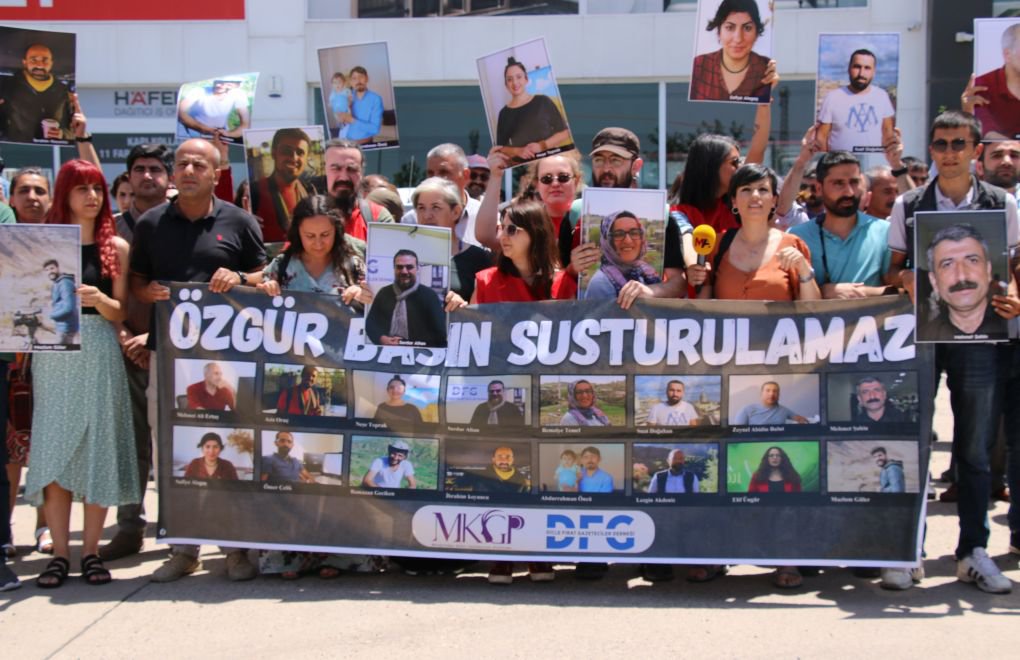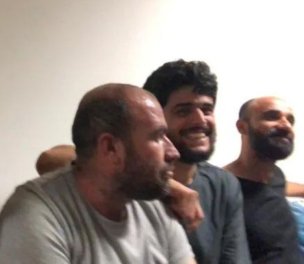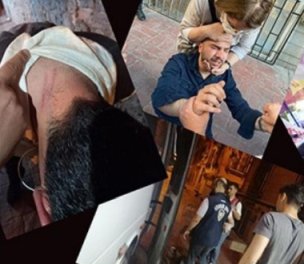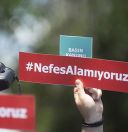Photo: MA
Click to read the article in Turkish (1) / (2)
Journalists who are members of the DİSK/Basın-İş union traveled from Istanbul and Ankara on June 17 for their colleagues who were arrested last week.
Sixteen journalists who were detained in the predominantly Kurdish province of Diyarbakır during police raids were remanded in custody on June 16.
The journalists from DİSK/Basın-İş visited the office of the Dicle Fırat Journalists Association (DFG) and JINNEWS in Yenişehir, whose office was raided, and materials were confiscated by the police.
DFG Co-chair Dicle Müftüoğlu and Mezopotamya Women Journalists Platform (MKGP) Spokesperson Roza Metina welcomed the journalists.
The journalists drew attention to the importance of the joint struggle against the attacks on the press and stated they would be in solidarity with the arrested journalists.
Özgür basın geleneğini tüm baskılara karşı inatla sürdüren Kürt gazeteci meslektaşlarımızla birlikteyiz ve tekrar söylüyoruz; özgür basın susturulamaz! #GazetecileriSerbestBırakın #GazetecilikSuçDeğildir pic.twitter.com/FPXf5kkZCH
— DİSK Basın-İş (@Disk_Basin_is) June 18, 2022
CLICK - Statement from CPJ for arrested journalists
"Journalism is not a crime"
After the visit to the JINNEWS and DFG offices, a press statement was organized in front of Ari Production which has been under police blockade since the raids on June 8th.
Journalists from DİSK/Basın-İş, representatives of non-governmental organizations, and political parties attended the press statement.
"The burden is not solely on the shoulders of Kurdish journalists"
The statement drew attention to the difficult working conditions of Kurdish journalists. "Free Press Cannot Be Silenced" was written on the banner that journalists were carrying, as reported by Mezopotamya Agency.
In the statement, Tolga Balcı, one of the journalists who went to Diyarbakır for solidarity said Kurdish colleagues are working under difficult conditions.
Recalling the words of the arrested journalist Ömer Çelik, "The burden is on your shoulders," Balcı said, "This burden is not only on the shoulders of our Kurdish colleagues. We are here to say that Kurdish journalists are not alone. We demand the release of our friends. Journalism is not a crime."
"We are here to defend journalism"
Journalist Sibel Yükler said that they came to Diyarbakir to defend journalism.
"Our friends are not the first ones arrested in the Kurdish press," she said.
"We have friends like Nedim Türfent, who was arrested in 2016 and is still in prison. This is not the first time, nor is it the last."
"Whenever journalists are arrested in this country, terrible things happen. We can be arrested at any time for any tweet after this disinformation bill is passed."
"We are here for our 4 imprisoned women friends"
Ceren İskit from the Coalition for Women in Journalism said, "We are here to stand by the imprisoned journalists and to increase solidarity."
"We are here for our 4 imprisoned women friends. Women journalists are either prosecuted or arrested. They only do their jobs and run after the truth. Journalism is not a crime, free press cannot be silenced"
What happened?Sixteen journalists who were detained in the predominantly Kurdish province of Diyarbakır during last week's police raids were remanded in custody yesterday(June 16). Aziz Oruç, an editor for the Mezopotamya Agency (MA), Safiye Alagaş, the news manager of JinNews, Serdar Altan, the co-chair of the Dicle Fırat Journalists Association (DFGD), Mehmet Ali Ertaş, the managing editor of the Xwebun newspaper, Neşe Toprak, Mehmet Şahin, Zeynel Abidin Bulut, Elif Üngör, Remziye Temel, Suat Doğuhan, Lezgin Akdeniz, İbrahim Koyuncu, Abdurrahman Öncü, Ramazan Geciken and Mazlum Güler were detained on the charges of "membership of an organisation" while Gülşen Koçuk, Kadir Bayram, Mehmet Yalçın, Esmer Tunç and Feynaz Koçuk, and İhsan Ergünlü, who was also detained along with the journalists, were released on probation. Resul Temur, the lawyer of 16 journalists spoke to bianet about the accusations against the journalists during the interrogation. "There is no crime interrogation regarding the actions of 16 journalists, it is journalism being interrogated." "There might be more arrests, detention warrants. The public and professional press organizations have a great responsibility. Freedom of the press should be protected." "For example, the expressions such as 'Kurdish question' and 'war' were used in the program that Aziz Oruç was presenting. He was asked, 'What do you mean by the Kurdish question?', 'What do you mean by war, do you define the problem between the organization and the state as war?', 'Why do you call it war?'" "This is not only the case for Aziz Oruç, it was the same for all other journalists, the language or the content of the programs have been the subject of accusations." |
CLICK - Journalism questioned: 'What do you mean by the Kurdish question?'
(RT/TB)








